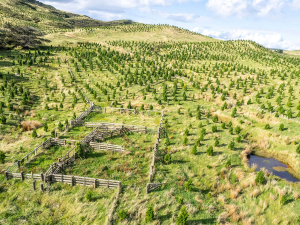Subsidies keeping wind, solar generation viable
OPINION: I recently wrote an open letter to the Prime Minister because at a recent Federated Farmers meeting, Chris Luxon told me wind and solar generation is not subsidised.
 The Climate Change Response (Emissions Trading Scheme Forestry Conversions) Amendment Bill has passed its third reading in Parliament.
The Climate Change Response (Emissions Trading Scheme Forestry Conversions) Amendment Bill has passed its third reading in Parliament.
The Government claims to have delivered on its election promise to protect productive farmland from emissions trading scheme (ETS) but red meat farmers aren’t happy.
The Climate Change Response (Emissions Trading Scheme Forestry Conversions) Amendment Bill has passed its third reading in Parliament.
Minister of Agriculture and Forestry Todd McClay says the Bill strikes the right balance between protecting New Zealand’s most productive farmland and maintaining confidence in the ETS.
“We campaigned on stopping the wholesale conversion of farms into pine forests, and we have delivered.
“This Bill restores balance. It protects food production, supports rural communities, and ensures foresters can continue to invest with confidence.”
But Beef + Land New Zealand believes the legislation still doesn’t go far enough to slow the rate of productive sheep and beef land being lost.
Chair Kate Acland says B+LNZ called for changes to the legislation during the Environment Committee process.
“We’re pleased to see the legislation contains some changes following consultation, including tightened criteria for temporary exemptions on land converted after 4 December 2024 entering the ETS, and bringing forward a review of the annual hectare limit to 2028.
“It’s also encouraging that the Government has committed to addressing the significant increase in pests that we’ve seen in the last couple of years as a result of the increase in forestry and improving fire management. These are areas of major concern for our farmers.
“However, what hasn’t changed is the fundamental issue that the legislation won’t go far enough in slowing down whole farm sales for conversion.
“We’re really disappointed our calls to extend the moratorium on whole farm conversions to all land classes, not just classes 1-5, have not been listened to.”
She says 89% of whole farm conversions to date have occurred on land classes 6-8.
Land class 6, in particular, is highly productive and vital to the red meat sector, she says.
“It is good to see some concrete limits in place, but we remain concerned that this is just tinkering around the edges rather than truly addressing this devasting issue for our sector.
“B+LNZ has been calling for action since 2019 and we’ve lost at least 300,000 hectares of whole sheep and beef farms to forestry interests since 2017. Our modelling shows that even with the new restrictions we could see a further 650,000 hectares lost by 2050 – and a total of one million hectares would equate to an 18 percent drop in stock units.
“We can’t double exports if we’ve planted our breeding land in trees. New Zealand’s ETS settings are artificially distorting the market and incentivising this wholesale conversion – we are the only country in the world, apart from Kazakhstan, to allow 100 percent offsetting in its carbon pricing mechanism.”
Key changes in the Bill include:
To celebrate the tenth anniversary of its annual Good Deeds competition, Rabobank will give away $100,000 to improve rural community hubs, schools, clubrooms, and marae across New Zealand.
Agricultural and veterinary product supplier Shoof International has appointed Michaela Dumper as its new chief executive.
Federated Farmers is celebrating following the Government's announcement that young farmers will be able to use their KiwiSaver funds to buy their first home or farm.
The Meat Industry Association of New Zealand (MIA) today announced that Chief Executive Officer Sirma Karapeeva has resigned from the role.
The winners of the 2026 Hawke’s Bay/Wairarapa Dairy Industry Awards were announced at the annual awards dinner held at Copthorne Solway Park in Masterton on Thursday evening.
Environment Southland is welcoming this week’s decision by the Environmental Protection Authority (EPA) to approve the release of Blaptea elguetai, a leaf‑feeding beetle that will help control the highly invasive Chilean flame creeper.

OPINION: A mate of yours truly reckons rural Manawatu families are the latest to suffer under what he calls the…
OPINION: If old Winston Peters thinks building trade relations with new nations, such as India, isn't a necessary investment in…